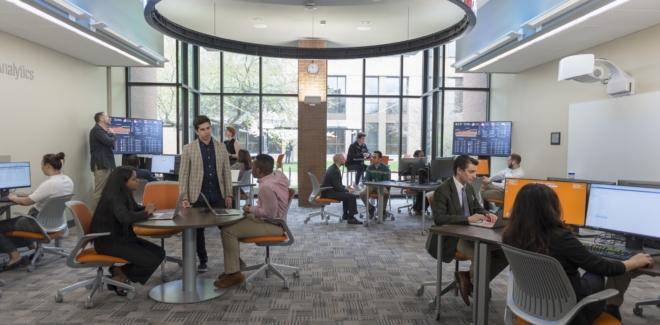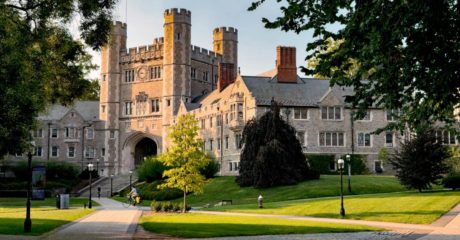Rochester Institute of Technology’s Saunders College of Business landed at No. 59 in this year’s 2023 rankings – down 6 places from their No. 53 place in our 2022 rankings. Of the three methodological categories, Saunders scored highest in Career Outcomes, at No. 31.
Saunders’s acceptance rate has hovered in the mid-70s to low 80s for the past few years, but in recent years, the schools have been more selective – with rates in the low 70’s. This year, the most recent incoming class had an acceptance rate of 72.30% in contrast to last year’s 70.96%. The average SAT score for the most recent incoming class this year landed at 1279 – quite a bit down from last year’s 1321.
Because of the co-op program, 100% of Saunders students graduate with a business-focused internship each year — an impressive feat that ensures each and every student has an experience to reference when it comes time to interview for future internships or employment. Employment wise, a whopping 92.55% of the Class of 2023 secured a full-time position within three months of graduation, nearly the same as the 92.64% rate for the class of 2022.
BIZ 1+2 PROGRAM
Saunders undergraduates can choose from the following majors: Accounting, Finance, Hospitality & Tourism Management, International Business, Management, Management Information Systems, Marketing, and Supply Chain Management.
Students get a business education starting on day one with The Freshman Experience: Biz 1+2 program – a rigorous and comprehensive curriculum that serves as a valuable foundational reference through the rest of students’ four-year education. While many other B-schools don’t require an experiential learning until the senior year capstone, at Saunders, every student gets a hands-on education starting on day one, giving them a head start on internship opportunities, and ultimately, employment.
“Creating a business plan for product/service – exposed me to the process of starting a company and maintaining its success – helped me contribute to my current company’s long-term sustainability and strategy/innovation,” one alumni told us.
YEAR BY YEAR REAL-WORLD LEARNING
Some 57.69% of surveyed alumni report engaging in at least one “signature experience,” whether through project work, simulations, global immersion, experiential learning, senior thesis, or capstone project, that was a key part of their business learning.
“Capstone project and many projects throughout the program were designed to work similarly to real-life projects at modern companies,” one alumni said.
Rather than just through a distinct capstone project or first-year experience, Saunders weaves experiential learning in each of the four years — an important distinction that equips students with plenty of valuable experience by the time they graduate.
STRONG CO-OP PROGRAM
The co-op program at Rochester Institute of Technology is one of the oldest and largest cooperative education programs in the nation, connecting over 3,600 students with over 1,800 employer partners, in over 7,700 job assignments (in a pandemic year). A full-time paid employment opportunity, the co-op program begins after students have completed their first two years of coursework. Co-op employers have included the likes of KPMG, EY, Tesla, Amazon, Mozilla, BMW, GM, GE, J&J and more.
For many students, the co-op experience gives them the opportunity to explore potential careers and gain valuable experience that they can reference in future internship and job interviews.
“The co-op program at RIT definitely gave me a ‘leg-up’ in terms of experience to talk about with a potential employer during interviews,” an alumni said. “Doing a day-to-day job for three months also gave me a sense of what I would be expecting in a corporate environment.”
Alumni say:
“The Co-Op Program was integral to my college experience and preparing for the “real world”. It helped me understand what fields I was most interested in and where I wanted to make my impact.”
“There were three critical engagements I had in my business school experience. One was the co-op program. I completed three co-ops (AFLAC, CloudCheckr, and Xerox) which provided real world experience. Secondly was the capstone project which was leading-edge and technology focused – I was able to research cloud computing and platform companies. Third was the engagement from professors.”
“Built on my core business knowledge but also opened my eyes to international business and not just government intervention in international business but also culture. Also strong focus on product innovation which is so important.”
“Several projects with real clients through undergrad as well as other experiential learning efforts. This was critical to applying skills in real business situations and was the most valuable part of my education at RIT.”
“The co-op programs I participated in gave me a lot of different work experience in different workplace environments. Also we had coding classes/a more technical curriculum which I think helped set me apart from other business students.”










